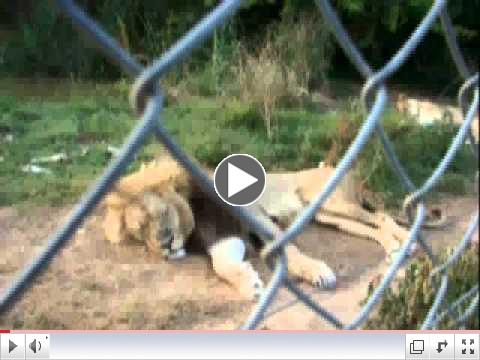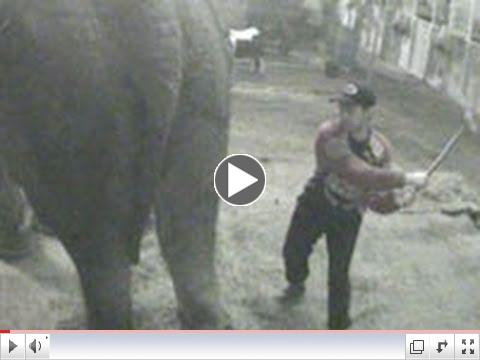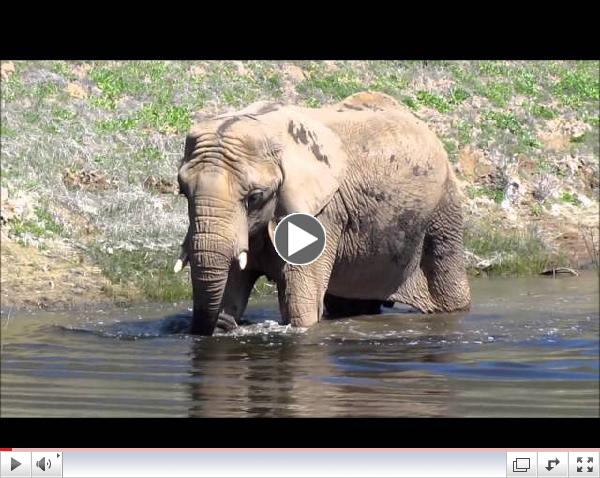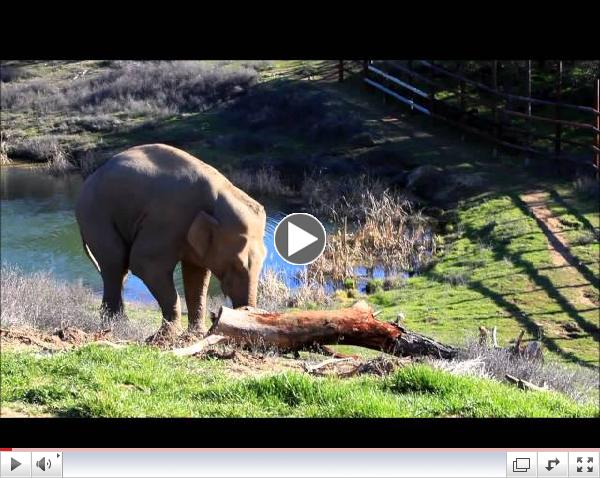|
PERFORMING ANIMAL WELFARE SOCIETY
Celebrating 30 years of protection, education, advocacy & sanctuary.
|
|
|
|
PAWS Joins
Global March For Lions
|
|
|
|
|
 |
 |
 |
 |
 |
 |
 |
 |
 |
 |
 |
 |
 |
 |
At PAWS we care for six lions - Denny (pictured above), Pfeiffer, Sheba, Simba, Bambek and Camba - who were victims of the exotic pet trade or came from the circus (visit our website for their stories). So we were honored to participate in the first-ever Global March For Lions held in more than 60 cities around the
 | |
Catherine Doyle, PAWS director of science, research and advocacy, speaks at the Los Angeles Global March For Lions.
|
world on March 15. PAWS participated in the Los Angeles march which drew over 250 people and featured PAWS' director of science, research and advocacy, Catherine Doyle, as a speaker at the post-march rally.
The Global March For Lions aimed to bring attention to the plight of lions in captivity and in the wild, with a special focus on the abhorrent practice of raising lions for canned hunts in South Africa. These lions are captive-bred and the cubs are used as a tourist attraction. When they become adults, they will be shot point-blank in a contained area. These canned hunt operations negatively impact the wild population of lions, which is dramatically decreasing. Hunt operators reportedly continue to take lions from the wild so they act "more like lions" when they are shot.
 | |
Actress Tippi Hedren was a featured speaker at the Los Angeles Global March For Lions.
|
PAWS was the first to investigate canned hunts in California and initiated the 1992 law that ended the practice in our state. Unbelievably, canned hunts still occur in the U.S., with many ranch operations in Texas.
Wild African lions now number less than 40,000 individuals and have vanished from 80 percent of their historic range. Lion populations are quickly declining or disappearing altogether. Only seven countries, Botswana, Ethiopia, Kenya, South Africa, Tanzania, Zambia and Zimbabwe, are believed to each contain more than 1,000 wild lions.
Lions are being affected by disease, habitat degradation, habitat and prey loss, and human-lion conflict. They also are being over-utilized for commercial and recreational purposes, including trophy hunting and the use of lion parts for so-called medicinal purposes. In fact, the U.S. is the leading importer of lion parts and products, and the trade is increasing, even though lion populations are decreasing.
 | | Campaign Against Canned Hunting |
African lions are teetering on the brink of extinction. Unless we take action this iconic animal could be lost to us forever. In 2013, we asked you to take action for African lions by commenting on a petition before the U.S. Fish and Wildlife Service to list the African lion as an endangered species. The lions don't have time - this critical designation must be made as quickly as possible.
We urge you to contact your senator(s) and representative and ask them to help move the endangered species designation for lions forward. To easily find your U.S. representative and senator(s), click here.
 | |
Los Angeles Global March For Lions
All Global March For Lions photographs courtesy of In Joy Photography |
|
|
When Sanctuary Is Not A Sanctuary
By Ed Stewart, PAWS president and co-founder
 | |
Ed Stewart
|
PAWS regularly monitors the plights of elephants around the world, through contact with other animal protection organizations close to these situations and via the news media. One of these elephants is Anne, who spent most of her life in a traveling circus where she was cruelly beaten and abused. She is now living at the Longleat Safari Park in the United Kingdom.
Anne was born in Sri Lanka where she was abducted from her family in the 1950s and sentenced to a lifetime of servitude in the animal entertainment industry. In the Bobby Roberts Super Circus, Anne was forced to perform unnatural and potentially harmful tricks, and she gave rides to uninformed people who thought elephant rides were fun. She was chained and abused with a bull hook - a spike-tipped weapon resembling a fireplace poker - and beaten when she failed to comply with commands, or sometimes for no reason at all. When not performing, Anne was chained by the legs and often spent her time devoid of the companionship of other elephants.
 | | ADI Video Exposť |
In 2011, a video exposť by Animal Defenders International showing Anne being savagely beaten by circus trainers ignited public outrage. This led to concerted efforts by individuals and animal welfare organizations to remove Anne from the circus. In Europe and the UK, there are no elephant sanctuaries. So the decision was made to move her from one facet of the animal entertainment industry to another: from the circus to a zoo.
Both Whipsnade Safari Park and Longleat Safari Park offered to take Anne. Whipsnade had an existing group of young elephants and would have been a shorter trip for this compromised elderly elephant. Longleat was chosen as her home.
Anne's transfer to the Longleat Safari Park was heralded as a victory by nearly everyone in the animal welfare world. It was indeed a step in the right direction - even if conditions at Longleat were imperfect. Anne was in a far safer place and she would receive needed veterinary care.
When Longleat accepted Anne, it was announced that the zoo was considering building an "elephant sanctuary" - a move supported by some animal groups. This raised a red flag in the animal sanctuary world because the park is a major
 | |
Circus owner Bobby Roberts with Anne. Photo by William Thornton
|
player in a commercial animal entertainment industry that depends on the display of wild animals for income. Throughout its 48 year history, Longleat has been home to elephants - 32 that were relocated to other zoos, circuses and safari parks before Anne arrived, and two that died. Talk of creating a "bigger" elephant enclosure at Longleat, still only a few acres in size, signaled that elephants might again be acquired and displayed there.
"Sanctuary" is often tossed around all too loosely. Calling a facility a sanctuary does not necessarily make it one. Commercial facilities, by their very nature, will never be sanctuaries. Facilities that are accredited by the European Association of Zoos and Aquaria (EAZA) that promote and support captivity and breeding programs are most definitely not sanctuaries. Facilities that acquire, purchase, discard, trade and euthanize animals for their own convenience cannot be sanctuaries. Facilities that are part of a zoo association that condones the killing, butchering and feeding of giraffes to other animals at a zoo can never be a sanctuary. Those who euthanize lions because they are beyond breeding age or too young to cope with their distorted captive situation can never be a sanctuary.
Many times "rescued" animals are transferred to facilities that call themselves sanctuaries even though they are open to the public daily and are dependent on ticket sales for their revenue. In true sanctuaries, the animals are not on display; the aim is to provide a more natural and intrusion-free life for them.
If we sit back and allow animal entertainment entities to call themselves "sanctuaries" we are defeating our own purpose. We will be sending the message that captivity is acceptable for elephants and other wild animals when it is not.
True sanctuaries are unbelievably difficult ventures to undertake and maintain. That is why you may hear of sanctuaries that are full to capacity, struggling or changing management. They are not open to the public because the welfare of the animals, many of whom have been severely neglected and abused, always comes first. Without the revenue generated by public ticket sales, these facilities must rely on other means of funding. This may include a limited number of well-planned educational and fundraising events each year to supplement the support provided by individual donors.
True sanctuaries also work to stop the problem at the source. In addition to caring for rescued animals, they educate the public about the problems of captivity in order to stop the exploitation of wild animals. At PAWS, we go even further. We initiate and help pass legislation to restrict and to ultimately prohibit the use of wild animals in entertainment and as pets. We also advocate for an end to the captive breeding of wildlife, especially those animals who are casually discarded after they no longer are of use or become a financial burden.
Fortunately, Longleat has opted not to create a sanctuary.
 | |
Anne in her small outdoor yard at the Longleat Safari Park in the U.K.
Photo by Mark Richards
|
In February, Longleat invited a group of elephant experts to attend a meeting to discuss Anne's future. I was one of those who attended. I was asked to provide my expertise on what it takes to create a sanctuary, and, more importantly, I also discussed what it means to be a sanctuary.
I visited Anne and I saw her facilities. I can tell you that Anne desperately needs a new indoor and outdoor area and she needs to be managed without use of the bullhook. The zoo says it will improve her exhibit, as reported in the media, and that they will adopt the protected contact management system. Both of these developments would be positive for Anne. The zoo has also stated that when Anne passes away her new enclosure will be used for another species, not for confining and displaying more elephants.
Anne's indoor facility at Longleat needs improving now. Any delays would further compromise her well being. She cannot go through another winter in the situation she has been in for the last three years. The zoo has now proposed significant improvements to Anne's living conditions and I am cautiously optimistic about these promises of change. We must all continue to monitor this situation to make sure these promised improvements are expedited.
Contrary to reports, none of the experts at the meeting believed it was optimal to keep an elephant alone.* Anne was originally sent to Longleat with the support of the public and animal protection organizations. For this specific elephant, and her specific circumstances, at that point in time, Longleat apparently provided a viable option for Anne.
Even though we in the animal welfare/animal rights community always hope there is good answer to a problem - the perfect solution - sometimes there just isn't one. This is the case for Anne, who is now 60 years old (very few elephants in captivity live beyond 50), and whose hind legs are crippled from her years in captivity. Her back feet drag on the ground when she walks, and she cannot climb even the most modest incline when the ground is damp.
If a wonderful elephant sanctuary existed nearby, and Anne was determined to be sound enough to make an easy trip to be with other compatible elephants, I'd say move her. This is just not the case.
Unfortunately, Anne has been put into an almost impossible situation through no choice of her own. These are the conundrums that captivity creates - and the animals are always the ones to pay.
I would like to applaud the efforts of all the organizations and individuals who have worked so hard to improve the life of this special elephant and who continue to monitor her well being.
* * * *
*According to an online world-wide elephant database, there are more than 40 elephants living alone in Europe today.
From the UK's MailOnline, March 28, 2011
Anne's agony: Battered, kicked and stabbed, the desperate plight of Britain's last circus elephant
|
|
Two Great Wins In Just One Week!
PAWS is pleased to announce that our campaigns for performing animals have resulted in two wonderful successes in just one week! For the first time in 88 years, the Los Angeles Shriners will not present a circus with performing animals. PAWS praised the Shriners in a press release for replacing cruel animal acts with carnival rides and games. That was followed by the announcement that the San Diego County Fair will not offer elephant rides this year! PAWS has been intensely focused on this campaign, working closely with the Orange County Affiliate of the League of Humane Voters-California and local advocates and organizations. We will continue our efforts until the rides are formally ended forever.
Ed Stewart, the late Pat Derby and PAWS have long worked to end the suffering of performing wild animals. Because most of our budget goes to caring for the rescued and retired animals at our sanctuaries, our advocacy budget is small. Please make a donation today to support this important work and help make more of these great wins happen for the animals.
|
 | |
THE END OF AN ERA
Three of California's most renowned crusaders for animal welfare: Virginia Handley (top left), PAWS co-f0under Pat Derby (top right) and Gladys "Gladie" Sargent (center). Their legacies will continue to inspire us all.
|
Virginia Handley, In Memoriam
PAWS salutes our dear friend Virginia Handley who passed away earlier this month. Virginia dedicated her life to bringing about change for animals via the political system. She was a highly respected lobbyist in California's capitol, Sacramento, and founded PawPac, a political action committee dedicated to passing humane legislation and electing animal-friendly legislators. Virginia was a popular speaker at
animal advocacy conferences, inspiring generations of activists.
Virginia and fellow animal crusader Gladys Sargent (shown above) could be found walking the halls of the Capitol and lobbying state officials five days a week. Virginia and Pat Derby were original members of the Director's Advisory Committee on the Humane Care and Treatment of Wild Animals for the California Department of Fish & Wildlife. Virginia continued to serve on the committee, which also includes Ed Stewart and PAWS' veterinarian Dr. Jackie Gai, until the time of her death.
"Pat and I worked with Virginia on many animal bills because she was the best at what she did," said Ed Stewart. "She was on top of every animal welfare issue in the state for the last 30 years. Pat always had Virginia's phone number on speed dial."
Thank you Virginia for all you did for the animals.
|

California Could Ban Performing Orcas
California state assemblyman Richard Bloom recently proposed landmark legislation that would ban the captivity of orcas (also known as killer whales) for entertainment.
The proposed law would end performance-based entertainment for all orcas in California, captive breeding programs, the export and import of genetic material, and the import and export of orcas within the state. It would also retire all captive orcas to sea pens (if available) and allow retired orcas to remain on display but not perform. To protect trainers, the bill would limit the amount of human interaction with orcas.
The proposal comes in the wake of the documentary, Blackfish, which may have forever changed the way the public views the confinement of orcas in marine parks. The film recounts the tragic life of Tilikum, a male orca confined at SeaWorld in Orlando, Florida, and his fatal attack on long-time trainer Dawn Brancheau. Blackfish suggests that captivity caused Tilikum to become psychologically unstable, and seriously questions the notion of confining these highly intelligent and socially complex animals for human amusement.
Assemblymember Bloom's fact sheet states: "As a state we should lead the way in ending captivity for entertainment purposes and should be ensuring our current captive population general welfare needs are taken care of, and that we end any future captivity whether it be by capture or captive breeding programs here in California."
While the Assemblymember is referring to orcas, the same could be said for elephants, big cats, bears and other wild animals bred and exploited for human entertainment.
We at PAWS commend Assemblymember Bloom for taking this brave first step and questioning the moral justification for the use of orcas in entertainment.
* * * *
by Ric O'Barry, Earth Island Institute, March 7, 2014
|
Hawaii Senate Judiciary Committee Passes Legislation to Protect Elephants From Ivory Trade
The Hawaii Senate Judiciary and Labor Committee unanimously passed a bill to prohibit the sale of ivory from elephants and other wildlife. The bill, which exempts legitimate antique ivory with necessary documentation showing that the ivory was legally acquired, will next be heard in the Senate Ways and Means Committee. The Hawaii bill is similar to a recent Director's Order issued by the U.S. Fish and Wildlife Service that improves enforcement efforts on the import, export, and interstate sale of ivory and other illegal wildlife products.
Most people don't know that the U.S. is the second largest market for the trade in ivory. By state, Hawaii is the third largest retailer of ivory and ivory products, after New York and California.
Nearly 100 African elephants are killed each day for the blood ivory trade. Only through immediate action will the extinction of this iconic species be staved off. PAWS is proud to be joining forces with animal protection and conservation organizations around the world, becoming signatory to a letter that was presented as testimony in support of this important legislation.
|
Animal Thinking And Emotion
PAWS' director of science, research and advocacy, Catherine Doyle, recently attended a conference in Washington, DC, on "The Science of Animal Thinking and Emotion: Sentience as a Factor in Policy and Practice." Presented by the Humane Society Institute for Science and Policy, the two-day conference featured speakers from around the world, sharing the latest findings on our understanding of what animals feel and think. Animals discussed include alligators and crocodiles (did you know they parent their young and have sophisticated methods of communication?), dogs, farm animals, Great Apes and cetaceans.
The conference aimed to promote the concept of sentience (the ability to feel, perceive, or to experience subjectivity) to improve conditions for animals via policy and law.
PAWS intends to carry this important concept forward in our legislative and advocacy work for performing and captive exotic animals.
|
|
New Videos From PAWS!
 | Thika's first time in the lagoon area of Lake Ireland (named in honor of Ireland Baldwin), part of the African elephant habitat at ARK 2000.
|
 | | Nicholas: "The Tree Stump" |
|
 | |
Oma is one of seven bears living in the Bob Barker Bear Habitat at ARK 2000.
|
Tickets For PAWS Fundraisers Now On Sale
Tickets for two of PAWS' annual fundraising events - the May 10 ARK 2000 Open House and our June 21 "Wines, Tigers & Beers" - are now on sale. Purchase tickets online, or call our office at (209) 745-2606, M-F, between the hours of 9 a.m. and 4 p.m. PST to charge by phone. Tickets for these events must be purchased in advance. There will be no ticket sales at the events. "Wines, Tigers & Beers" is an adults-only event. Visit our website Calender of Events page for more information.
CLICK HERE FOR OPEN HOUSE TICKETS
PURCHASE "WINES, TIGERS & BEERS" TICKETS HERE
|
 | |
Peggy Burr had a life-long dream to see an elephant in a natural setting. On March 15, her dream came true. Peggy, accompanied by her son Smith
and friend Judith, attended a PAWS "Seeing the Elephant" educational weekend. Peggy, by the way, is 94 years young!
Thank you for visiting us Peggy. You made our day. - Ed Stewart
|
|
March Amazon Wish List Donors
Karol Black: 1 box of copy paper. Carol Haft: 1 bottle of RenAvast. Robert Rozel: 1 box of Frosted Flakes, 5 lbs. Psyllium. Carolyn B. Greenspan: 1 bottle of RenAvast. Francine Taylor: 1 tub of Flax Seed, 1 bottle of Milk Thistle, 1 bottle of RenAvast, and 1 bottles of Renal Essentials. Kelly Martin: 1 tub of Flax Seed. Anonymous Donor: 1 tub of Flax Seed.
View wish list items that are needed, but not listed on the Amazon list, here.
Special thanks to. . .
Thank you to longtime volunteers John Gardella and Chris Christensen for their help at our Galt Sanctuary - all the sorting, organizing and shredding projects in the office, as well as building a new platform/perch for African lions Denny and Pfeiffer and a new den box for tiger Claire.
 | |
A big thank you to Sandi Peck for donating her 2008 Land Rover for use at ARK 2000. We first met Sandi and her mother Ruth when they attended a "Seeing the Elephant" weekend. Sandi also funded the surveillance cameras mounted in the elephant crates during the Toronto elephants' move to PAWS. That system allowed the elephants to be monitored 24/7 during their journey to California.
|
|
|
There are many ways you can help PAWS animals:
|
|
|
|
|
Adopt A PAWS Animal
If you would like to help our animals, one of the best ways is to become an "adoptive parent," or give a PAWS adoption as a gift to an animal lover in your life. PAWS adoptions are symbolic adoptions only. No animal will be sent!
|
PAWS Partnerships
Help us change the life of a victim of captivity by becoming a PAWS Partner.
PAWS partnerships help support our sanctuary operations and the day-to-day care of the animals.
|
You can help us make sure captive wildlife in need of shelter will always have a PAWS sanctuary to call home!
Donate To PAWS
Three ways to give and every donation matters.
Donate Your Vehicle
Learn more
|
|
Pat Derby: A Memorial Celebration
2-Disk DVD $30.00 + $5.95 shipping and handling
 A celebration of PAWS co-founder Pat Derby's life and legacy was held at the Crest Theatre in Sacramento, California, on March 29, 2013. Pat passed away on February 15, 2013. The entire three-hour program is now available on DVD with the proceeds from its sale benefiting PAWS' animals. This two-disc set includes heartfelt tributes from Pat's partner and PAWS' co-founder Ed Stewart, as well as Bob Barker, Kim Basinger, Lily Tomlin, Tony LaRussa, Kevin Nealon, Congressman Sam Farr, and many more.
|
Save The Dates!
November 8-10, 2014
PAWS' International Captive Wildlife Conference
November 8, 2014
PAWS' 30th Anniversary Gala Celebration
Both events are being held at the Pickwick Conference Center
Burbank, California
Registration, speaker list and hotel information for the conference,
as well as ticket sales for the Gala, will be available online mid-April.
Watch our Calendar of Events listings for details.
|
|
|
|
 |
 |
 |
 |
 |
 |
 |
 |
 |
 |
 |
 |
 |
 |
|
|
PO Box 849
Galt, CA 95632
(209) 745-2606
|
|
|
|